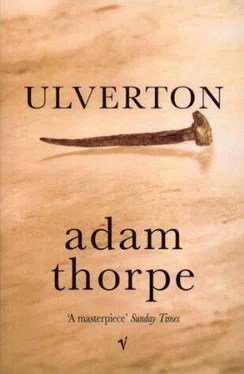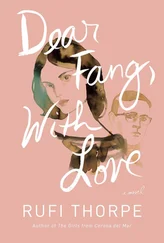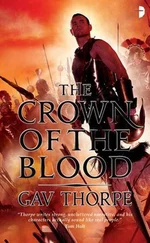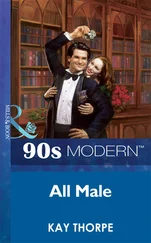I waited, therefore, for the hour before sunset (when the workers were prone upon their prayer-mats) to make this plate, that might remind us of the Tomb of our Risen Lord — with the stone set aside, and the narrow opening; to enter which one is forced to crouch, and walk almost on all fours, before standing upright in the chamber, whose air is so cool upon one’s moist cheek, that one immediately shivers. I have included Mr Stephen Quiller for a human scale, that the true size of the opening may be ascertained — although it must be said that he is a tall man, and the smallness of the opening may have been thus exaggerated.
If this image also puts one in mind of the stone burial chamber upon the English downs (see Plate XIII, ibid .), then in such coincidences of appearance, a long sea-voyage apart, may lie a secret web of knowledge, that once ascertained and drawn out, could provide a key to all mysteries — and make of the past a well wherein our own thirst might be slaked, and our petty confusions buried.
Plate XXXIX THE FIRST CHAMBER
Mr Stephen Quiller was considerate enough to allow me a full day within this small room, in order for the apparatus necessary to the recording of its appearance to be set in place: ten lamps in all were required, and the smoke from their explosion almost choked myself and my Egyptian helpers, and Mr Quiller himself. The results are, as you can see, wholly satisfactory, and this method is far less laborious than that of the pencil and paper, though the latter is still more effective when close detail is required, in these difficult conditions: for the effect of the sulphur lamps is to whiten some areas overmuch.
I am intrigued, still, by the small object on the upper left — no doubt, as Mr Quiller surmised, a trick of the light: for it does resemble a bird, such as a rook, or a raven, with spread wings — though no image of that kind (indeed, this first chamber is quite lacking in decoration, save a patterned frieze) is to be discerned upon the walls of this room. This puts me in mind of an instance when, in the developing of a forest subject, I saw (to my evident surprise) what appeared to be an old, white-bearded visage amongst the undergrowth — but on closer inspection, I saw to be the happy conjoining of a grass-stalk, and the leaves of a blackberry bush, and a patch of dappled sunlight.
Imagine my relief — that I had not, after all, captured the Daemon of the forest, or disturbed the Spirit of the woods! Such coincidences of light and dark, inevitable in our art, have given rise to the wildest of speculations, and set bolting out of their lairs the creatures of credulity and superstition, that one might have thought had long gone firmly to ground!
Plates XXXX to XL THE BURIAL CHAMBER: FIVE VIEWS
Emptied of its material riches by robbers soon after the mummified corpse of the immured personage was sealed from the outside world, the chamber here shown nevertheless lacks nothing in atmosphere, in beauty, and in historical interest. Indeed, I stayed a whole morning in its dark interior without surfacing, so entranced was I by its murals; which are highly coloured, and exquisitely executed. Scenes that my ignorance could not provide an iconography for, rippled upon the plastered surface of the chamber walls: harvest dances, the casting of seed, a wedding procession, a birth, and a journey in a reed boat upon tiny wavelets that seemed almost to shiver in the damp air funnelling into the tomb (and more savage scenes of war, and those I can only describe as indelicate) — these and many others surrounded us upon three levels: a pulsating and ancient tapestry, that for several thousands of years was hid in utter darkness — a blindness wherein nothing moved, no dust collected, and not a sound was heard.
Indeed (I hear myself surmising) was it not until the stone slab stirred again that these paintings had, since the paint was first dry, any kind of existence? Without light of any sort, or eyes to pierce the darkness, did not these works lack being — for thousands of years, even — until Mr Quiller’s strong shoulders, and those of his assistants, slid the slab back inch by inch, and sent a pencil-beam of light probing over hands, and eyes, and beaks, and feet? As if breath was stirring within them, and their parts were being touched into swelling fact? Did not the first lamp, and Mr Quiller’s astonished eyes behind it, act as vivifiers, the torch of grace upon these lost creatures? And was not that non-being meant to last for eternity — these images merely votive in origin, and left for eyes higher, and stranger, than our own?
Look again, carefully, dear reader, upon these ancient scenes: though the conditions of their recording made detail obscure, you may note the tiny glass vase at the woman’s eyes, the wrist-guard upon the warrior’s arm, the cushion upon the throne, the sacks of corn within the cart and the carter’s whip, the horns upon the plodding oxen, and the great sharp-beaked profile of the bird-god upon his delicate ankles. Sudden illness prevented me from completing the record, alas, but reflect on the ease of your viewing, before you ring for sherry, or for tea: a few weeks after my departure, it was noted (I quote from Mr Quiller’s recent letter to me) that ‘the colours you thought so fresh (particularly the red) are somewhat dulled, and several areas show signs of severe deterioration — something lifting the paint-surface in flakes, as if a scrubbing-brush had been applied. In our opinion it is the sudden shock of the air, and the evil properties of our own breath, that is causing the damage to the pigment. Thus the removal of the walls is not possible, and, when our detailed drawings are completed, we will perforce seal the opening, and shut this masterpiece once again from the light. I am sorry … your sudden ill-health prevented you from completing the photographic record, as this would have been of inestimable advantage to us.’ How much more fortunate, then, that my camera’s small round eye was at hand to capture at least some of these ancient scenes, before they began to perish.
Plate XLV THE CROQUET GAME
I have placed this delightful Example deliberately here, not only for chronological accuracy (it is the most recent photograph, from this present hot July of 1859) but also to act as a modern comment upon those strange scenes you have just perused: for if this plate were to be found millenniums hence (as is quite possible) what would our after-generations make of this matter of hoops and mallets? Is the personage with one knee upon the grass (the late — alas! — Mr Stephen Quiller — see previous plates, ibid .) in obeisance to some unseen, ruthless deity? Are the long black skirts of the ladies donned as uniform for some violent battle or is this a graveyard, and they in mourning before those memorials of curved wire embedded in the lawn? Is the man in the centre, with his weapon resting on one shoulder (our village Doctor, to be precise), the leader of this ceremony, or the victim of some dreadful rite? And what does the ball there, in its indent of grass beside his feet? Why is his mouth open: is his expression one of joy, or terror? And what does the pale woman (myself!) seated in the wicker Bath-chair before the hedge? Is she alive at all — or is she some waxen idol, the Daemon of the proceedings?
How faint our hold on this hour of life! How weak our grasp on the throbbing vein of ambition! How fleeting these teeming generations, sunlit by the great god Ra, then blessed by a redeeming Creator!
You may be wondering whether it was indeed I who lifted and dropped the shutter upon this scene, seeing my own portrait amongst the group: a strong thread (visible in my right hand) usually suffices, if correctly attached, and tug
Читать дальше










